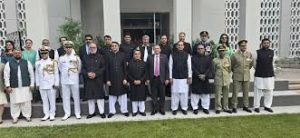Ambassador Asim Iftikhar Ahmad earns praise for resolute and principled diplomacy at UN

Celina Ali
Islamabad: Pakistan’s Permanent Representative to the United Nations, Ambassador Asim Iftikhar Ahmad, continues to be a pillar of strength for Pakistan on the world stage, eloquently defending national interests with integrity and strategic insight.
In a time of mounting regional tensions, his calm yet firm diplomacy has won admiration for presenting Pakistan’s case with clarity and conviction. His recent engagement at the United Nations Security Council (UNSC) underscores his vital role in highlighting Pakistan’s commitment to peace while standing unyieldingly for justice and sovereignty.
Ambassador Ahmad’s performance during the closed-door UNSC consultations on the “India-Pakistan Question” was widely noted for its strength and substance.
At a media stakeout following the session, he reaffirmed Pakistan’s consistent position: while the country seeks peaceful and cooperative relations with all its neighbours, including India, any dialogue must be grounded in mutual respect and sovereign equality.
His leadership at the UN is marked by a balance of diplomacy and principle — never hesitating to call out unilateral aggression or misrepresentations.
Among the key issues raised, Ambassador Ahmad stressed Pakistan’s demand for an independent and credible investigation into the Pahalgam incident, categorically rejecting India’s attempts to implicate Pakistan.
He warned that India’s illegal actions on April 23, its military build-up, and provocative rhetoric have dangerously escalated tensions. While reiterating Pakistan’s desire to avoid confrontation, he made it clear that the country is fully prepared to defend its sovereignty in accordance with Article 51 of the UN Charter.
Ambassador Ahmad also brought urgent attention to India’s unilateral suspension of the Indus Waters Treaty, calling it an act of aggression that threatens the lives of over 240 million Pakistanis.
“Water is life, not a weapon,” he stated powerfully. He further emphasized that the Kashmir dispute remains the core of regional instability, outlining the continued human rights violations suffered by Kashmiris.
He urged the UN to implement its own resolutions and facilitate a UN-supervised plebiscite to allow Kashmiris to exercise their right to self-determination.
Finally, he reminded the Security Council that Pakistan has paid a heavy price in the global fight against terrorism, with over 90,000 lives lost and significant economic sacrifices.
He called for truth and accountability in the face of India’s attempts to distort this reality, including its role in state-sponsored terrorism and extraterritorial assassinations, such as the case of Kulbhushan Yadav.
Ambassador Ahmad urged the UNSC and Secretary-General to remain actively engaged in peacemaking and preventive diplomacy, ensuring stability in one of the world’s most volatile regions.





